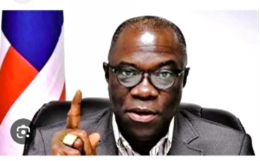Former Senator J. Milton Teahjay of Sinoe County has levied criticism against Liberian President Joseph Nyuma Boakai, citing delays in enacting crucial policy decisions and a lack of focused implementation, contrasting sharply with the high expectations set during the 2023 presidential campaign. Teahjay’s critique centers on the perceived discrepancy between campaign promises and the current pace of governmental action. While acknowledging the initial momentum generated by Boakai’s administration, particularly in areas like infrastructure development, Teahjay pointed to the unfulfilled pledge of delivering “yellow machines” – heavy equipment essential for road construction – as a prime example of the administration’s faltering execution. These machines, paraded through Monrovia months ago, have yet to materialize, symbolizing a broader concern regarding the government’s ability to translate promises into tangible results.
Teahjay argues that the President’s susceptibility to “popular demands” and a tendency to shift focus are contributing factors to these delays. He suggests that the administration’s attention is being diverted by immediate pressures, hindering the sustained effort required to achieve long-term policy goals. The former senator emphasizes the strategic importance of road development, asserting that a robust infrastructure program connecting the southeast and northwest regions would be a cornerstone of Boakai’s legacy and a potent campaign tool for reelection. In Teahjay’s view, tangible achievements in this area would resonate more powerfully with the electorate than any campaign rhetoric. He believes that the successful execution of such a program would effectively preempt the need for extensive campaigning, allowing the roads themselves to speak to the administration’s effectiveness.
While critical of the delays, Teahjay acknowledges the challenging economic landscape inherited by the Boakai administration. He recognizes that reversing years of economic stagnation is a complex and protracted undertaking, offering a measured perspective on the time required for meaningful change. He contrasts Boakai’s efforts with the performance of former President George Weah, whose administration he criticizes for a lack of substantial achievements beyond some inner-city road projects. This comparison highlights Teahjay’s belief that while progress may be slow, the current administration is at least attempting to address fundamental economic issues that were previously neglected.
Drawing parallels between President Boakai’s governance style and that of former President Ellen Johnson Sirleaf, Teahjay notes similarities in their approaches to policy formulation and consultation. He commends Boakai’s willingness to tackle deep-rooted economic challenges, emphasizing the importance of confronting these issues head-on. However, he also cautions that effective execution remains a critical vulnerability. The commendation of Boakai’s consultative approach suggests a preference for informed and deliberate decision-making, while the emphasis on execution underscores the need for translating these decisions into concrete actions.
Teahjay’s critique, delivered on State Radio ELBC, offers a nuanced perspective on the Boakai administration’s performance. He balances criticism of delays with an acknowledgment of the inherited economic difficulties and a recognition of the administration’s efforts to address long-standing challenges. His focus on road development as a key indicator of success underscores the importance of tangible results in infrastructure projects for both the population and the President’s political future.
The former senator’s political trajectory adds another layer to his commentary. Having served two terms as a Senator for Sinoe County under the Unity Party (UP) banner, and later aligning with the Coalition for Democratic Change (CDC) before returning to endorse Boakai and the UP in the 2023 elections, Teahjay’s critique comes from someone familiar with the inner workings of Liberian politics. His shifting party affiliations suggest a pragmatic approach to political engagement, and his current stance suggests a vested interest in the success of the Boakai administration, albeit one tempered by a critical assessment of its performance to date. His public expression of concern, particularly concerning the delays in implementing promised initiatives, likely resonates with segments of the population who share similar expectations and anxieties about the pace of progress under the current administration.


